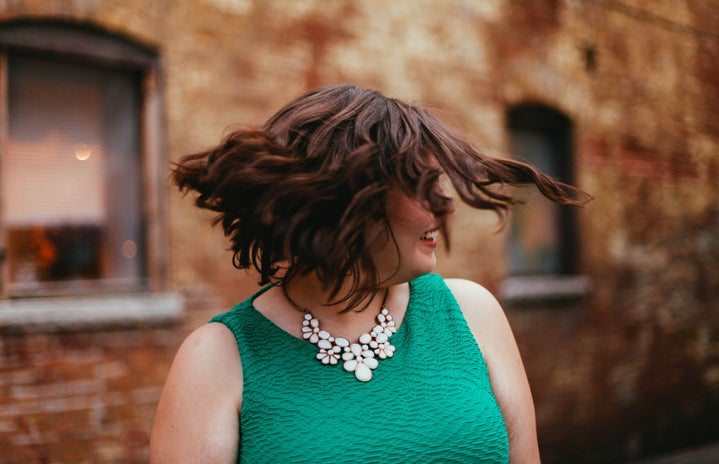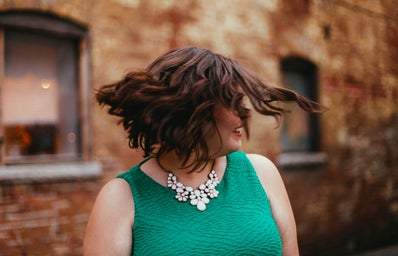Since 2015, I’ve been in a cycle of growing my hair out to shoulder length and chopping it off to chin length or above. Each time I decide to cut it, I feel emboldened and excited. I, having a tendency to assign meaning to most events in my life, imagine that the hair falling to the floor holds every worry I’ve carried with me since the last chop. The hair falls and I feel like a blank slate, powerful with the new lightness of both my hair and my thoughts.
And truly, I love how I look with short hair. At the same time, I’ve noticed that every time I cut my hair short I feel the need to wear makeup, to dress “girly,” to somehow prove my femininity as though short locks will render me masculine. With long hair, I don’t wear makeup regularly, nor jewelry, heels, or dresses. I know that this comes off as a tiresome “not-like-other-girls” trope, which I despise as much as the next person, but I’m typically confident (and lazy) enough that I don’t feel the need to get all dolled up on a regular day. Makeup can of course be empowering and fun, and it is not my intention to look down on makeup users. Makeup is great! But, I take issue when I feel like I am applying it out of necessity rather than desire.
I know that feeling the need to apply makeup will pass, as it always does once I adjust to seeing my short hair in the mirror. But for the first couple of weeks, thinking about my appearance takes up a significant amount of my mental space—space far too valuable to be filled with thoughts about what other people might think of my slightly-less-traditionally-feminine appearance.

Why do I feel this way? It doesn’t take long to identify the culprit: the dreaded patriarchy strikes again! In this age of feminism, it shouldn’t come as a surprise that women are portrayed primarily through the male gaze in the media, with a great deal of emphasis on our femininity. Even though culturally we’ve become more accepting of diverse appearances and what it means to be a woman, there is still a significant expectation for our appearances to please men. Oftentimes, this means wearing makeup and clothes that highlight our bodies. And it is so, so difficult not to internalize these expectations. Screw that noise!
I want to feel good in my body, without having to think about it as a major source of mental focus.
I know that I am beautiful and strong. I also know that when I cut my hair, I spend way more time thinking about how I look. If possible, I’d like to stick with the first sentence and ditch the latter. This idea of spending less time thinking about one’s appearance and one’s body is called body neutrality.
Where body positivity encourages people to love their body and their appearance, body neutrality urges people to spend less time thinking about it in general. Rather than focusing on learning to love your appearance, body neutrality is about simply existing in your body. Loving your appearance is fantastic, but it can also feel like a chore that only highlights the things you don’t yet love. If I don’t love the way I look one day, but I tell myself that I do, I know that I’m lying, and I just feel guilty about not loving every inch of myself at all times. It is also so easy for body positivity to spiral into fixation on appearance, or to assign one’s worth to their appearance. Again, true body positivity can be fantastic and confidence boosting. But it seems to me we don’t need to be so extreme all the time, either loving or hating your body. Sometimes, it’s okay to just be. Body neutrality is about being grateful for what your body lets you do, and not passing judgment on your appearance.
Certainly, this isn’t easy. Going out without makeup on while having short hair has been an active effort of mine to move into the mindset of body neutrality. It’s alright to want to use makeup—body neutrality just suggests we move away from viewing it as a necessity. In an age where casting judgment upon appearance is king, being neutral is an act of rebellion.
All this to say, I love my hair. And on days where I don’t? Well, that’s okay too.



